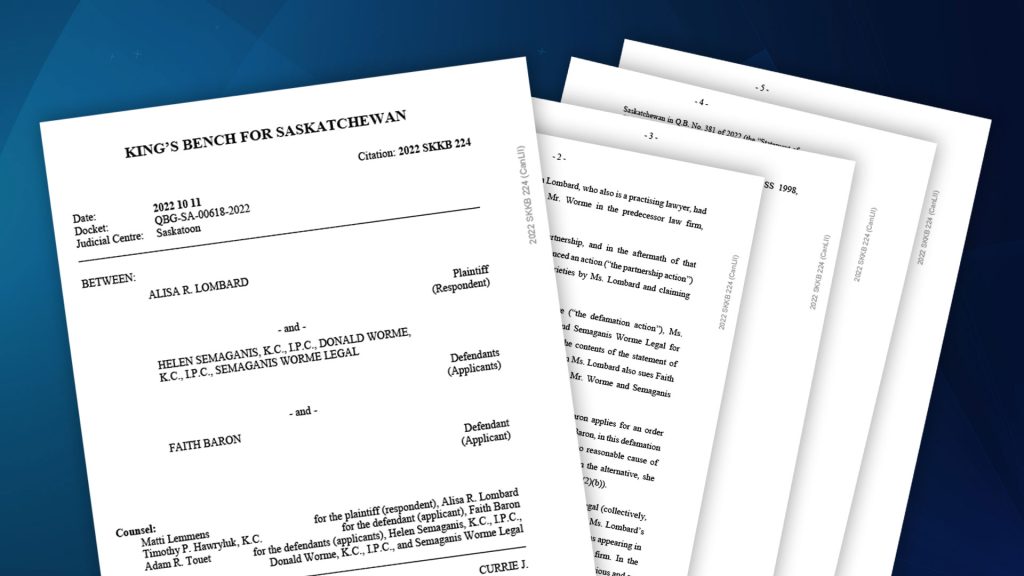
UPDATE:
The Indigenous lawyer who is lead counsel on a proposed class-action lawsuit for sterilization victims in Saskatchewan contacted APTN News after this story was published.
Alisa Lombard said the lawsuit is moving forward in a regular manner, including being part of a recent case management meeting with a judge.
Lombard said she is working on a website to help keep class members up to date.
“The way that this actually works is you file a class action and then in a jurisdiction like Saskatchewan, it’s not like that everywhere, but it is like that in Saskatchewan, it’s opt out,” she explained in a telephone interview.
“So that means if you meet the definition of the class as described, then you are, like, de facto included.”
Lombard said class members do not have to contact lawyers or have all of their medical records to be part of the lawsuit. She also she is also developing ways to support the female class members.
Lombard agreed the class-action process has taken a long time. She said she is also working on Bill S-250 at the Senate to criminalize the practice of coerced sterilization, which could be punishable by up to 14 years in prison.
“The law only fixes a very narrow amount of things, if anything, really. And it doesn’t extend to provide the healing that’s required,” she said.
“Our instructions are clear: make sure this doesn’t happen again, hold those responsible accountable, and then pursue compensation. We are trying to seek a measure of systemic change.”
An Anishinaabe woman, who says she was sterilized against her will following childbirth, is questioning a proposed class-action lawsuit meant to bring relief.
“When I think about the whole situation…it feels pointless to me,” said Luanna Robertson, 51, of Sagkeeng First Nation in Manitoba.
Robertson joined the lawsuit that was proposed after a series of news stories on the practice of both forced and coerced sterilization of Indigenous women across Canada.
The lead counsel was First Nations lawyer Alisa Lombard who was with Maurice Law Barristers & Solicitors.
“In this putative class action the plaintiffs allege that the defendants participated in a practice of sterilizing Aboriginal women, by way of tubal ligation, without the women’s proper or informed consent,” said the statement of claim.
“Citing proportionality, the health authority and physicians point out that the plaintiffs claim an award of at least $7 million for each member of the class. M.R.L.P. says in an affidavit that she believes that the potential class members number more than 40.
“At the hearing of this application counsel indicated a current estimate of 50 members. If there are 50 members of the class, the plaintiffs are seeking an award of at least $350 million.”
Robertson told APTN News she signed on in 2020 at the Maurice Law office in Calgary.
She said she underwent the procedure in a Saskatchewan hospital following the difficult birth of her daughter in 1997.
“The doctor scared me and my husband, saying my baby was in medical distress,” she told APTN.
She alleged the doctors “butchered” her — cutting, tying and cauterizing her fallopian tubes —and said she was told it would all be reversible.
“After my daughter was born there was smoke in the room and I asked, ‘What are you doing? What is that.’ I could smell burning flesh.”
Angry about what happened, she went to see a lawyer to check into a lawsuit.
“I couldn’t find anyone to help me,” she said. “I went through such a bad depression that lasted years and years.”
None of the allegations have been proven in court.

Lombard testified before the Senate Committee on Human Rights in 2021 as lead council of the class-action lawsuit in Saskatchewan.
The committee began a study in 2019 examining the history of eugenics – the belief that certain races or ethnicities were superior to others and that it was necessary to control their reproduction in order to maintain a desirable population – and forced and coerced sterilization.
It said hospitals started sterilizing Indigenous women in Canada beginning in 1930s.
Lombard told the committee the women “have been robbed of their sacred ability to carry life, give birth, to care for their child, to pass on their knowledge and culture.”
The Native Womens’ Association of Canada (NWAC) put together an expert forum to collect research.
It said two Canadian provinces – Alberta and British Columbia – passed sexual sterilization legislation.
It estimated more than 1,145 Indigenous women were sterilized across Canada between 1966 and 1976.
Lombard was recognized as one of Chatelaine’s Women of the Year in 2018 for her work on the class action lawsuit, according to a blog post on the Maurice Law website in 2019.
But Maurice Law told APTN it is no longer involved with the class-action. It referred APTN to Koskie Minsky LLP of Toronto.
Its statement of claim said the focus is on Indigenous women in Alberta.
“Koskie Minsky commenced a class action on behalf of all Indigenous women who underwent a sterilization procedure (tubal ligation) without proper or informed consent,” it said in an email to APTN.
Koskie Minsky LLP confirmed that Alisa Lombard was not involved in their class action lawsuit.
History of eugenics and forced or coerced sterilization in Canada
According to court records obtained by APTN, the Saskatchewan class action was scheduled to have a case management review in January 2023.
Robertson said she is still in the dark.
“I was told there was 50 other women who signed on. I wonder how many of them feel like they know what is going on?”
Meanwhile, APTN obtained court documents showing Lombard was listed in a partnership with Semaganis Worme Legal in Saskatoon from February 2019 to February 2022.
This is during the same time period that Robertson said she joined the sterilization class-action at Maurice Law.
The court documents show Semaganis Worme Legal is suing Lombard.
“The partnership (Semaganis Worme Legal) discovered that, while Lombard was partner, she converted, diverted, and/or misappropriated funds that should have been received by the partnership from a client, and that she entered into a contract for legal services directly with a client without the consent of the other partners.”
The statement of claim said, “Semaganis and Worme made several demands for the return of the funds to the Partnership, but all such demands have been ignored or refused by Lombard.”
Lombard, the documents show, filed a counter-suit alleging the accusations hurt her reputation.
Her suit said: “Ms. Lombard was informed that Mr. Worme told the relative of her client that Mr. Worme was ‘charging Ms. Lombard for stealing over $100 000’ from him, that the matter was currently before the courts and that as such ‘Ms. Lombard has no credibility’.”
The claim alleges the “defamatory statements tend to lower the esteem of Ms. Lombard in the minds of ordinary members of the public.”
Lombard was seeking general damages of $750,000, punitive exemplary damages of $300,000, and aggravated damages of $300,0000.
But the judge said a defendant can’t sue for defamation based on the fact that a lawsuit has been initiated, and the statements of claim are considered by a judge throughout the trial.
In the end, the judge ordered Lombard to pay costs of $3000 to Semaganis Worme Legal and their lawyer Faith Baron.
Lombard also noted to APTN that she had been awarded costs in the original lawsuit between herself and SWL.
Read More:
APTN Investigates: Against Their Will
Quebec report says forced sterilization poorly reported or documented
The case is continuing in arbitration, according to the court documents.
Robertson, for her part, is still trying to find out about the sterilization class action she joined.
She filed a complaint with the Law Society of Alberta, which she shared with APTN, about the lack of response from lawyers. She said she also called three additional lawyers whom she said the law society said would help her.
So far, she said no one has called her back.
The law society, which governs lawyers’ behaviour in the province, would not tell APTN if it had received any complaints about Lombard.
“By statute, complaints and investigations are confidential, starting the minute we receive an expression of concern about a lawyer,” said its CEO and executive director, Elizabeth Osler, in an email.
Robertson said she wished there was more support or an advocate to help her, because she is feeling abandoned by the process.
“I haven’t even sat down to write my story again because a lot of feelings come up for me. It is going to hurt,” she said.
Story has been updated February 17, 2023 to include information regarding the Koskie Minsky LLP class action.










